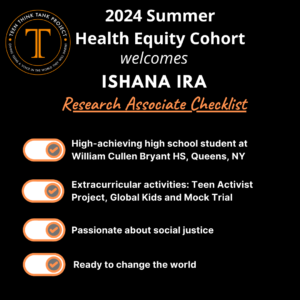Mental Healthcare
"Mental illness is the only disease that we blame the person for having."
Dr. Kenneth Paul Rosenberg, Author
Our Mission
This cohort of nine high-potential teens set out to investigate and address the financial, social, and legal barriers contributing to America’s mental health crisis. Through their research, our research cohort gained a deep understanding of how social stigmas, flawed policy initiatives, and inadequate healthcare systems leave millions of Americans struggling to access the mental health care they need. By equipping these young change agents with the knowledge and skills to tackle these issues, we aim to drive meaningful solutions that can transform mental health care in the United States.
Our Work
On August 8, 2024, the Teen Think Tank Academy’s Mental Health Equity Research Cohort presented its policy framework in a live webinar.
We thank all those who attended the live broadcast and all those who have supported our work to bring mental health equity to all Americans.
Our Framework
True Health Equity: Providing Access to Mental Healthcare for All!
The United States is grappling with a profound challenge in achieving mental health equity. Millions of Americans suffer from Serious Mental Illnesses (SMI), yet many are unable to access the necessary care due to a range of barriers. If mental healthcare were more accessible in the U.S., countless lives would be positively transformed, yielding significant economic and social benefits for the nation. Addressing the mental health crisis is therefore an urgent imperative to improve individual well-being and enhance the overall quality of life in the country.
Economic Impediments
One of the most pressing challenges lies in economic impediments, particularly the geographical disparities that affect access to mental healthcare. Americans residing in rural areas face significant obstacles in obtaining adequate care compared to those in suburban regions. This disparity is largely due to the increased distances to essential services such as hospitals and schools, compounded by a shortage of mental health professionals in these areas. To mitigate these challenges, improving access to mental health services in rural communities through telehealth, enhanced funding, the implementation of school-based and community-based mental health programs, and fostering collaboration among funders and stakeholders is crucial.
Social Impediments
While economic barriers are critical to addressing, social impediments also play a significant role in hindering mental health equity. Social issues, including stigma, have a profound impact on mental health and can even prevent access to necessary care. The pervasive stigma surrounding mental health creates a public perception that leads to systemic discrimination, ultimately resulting in self-stigma, where individuals feel ashamed of their mental health conditions. To combat stigma, it is essential to advocate for mental health awareness, enforce mental health parity laws, and promote activities that foster well-being and self-worth. Additionally, addressing the impact of incarceration on mental health, by facilitating the reconnection of incarcerated individuals with their families, reducing violence in jails, and improving the overcrowded and inadequate conditions of prisons, is vital. Furthermore, understanding and addressing childhood trauma and environmental factors in patients through improved support systems is crucial in achieving mental health equity.
Legal & Political Impediments
Legal impediments also present significant challenges that can be addressed through governmental intervention. The current landscape of mental health support in schools reveals a complex interplay of funding inadequacies, rural-urban disparities, and inconsistent state laws. This underscores the need for increased funding, standardized laws, and enhanced mental health education to create a supportive environment where students can thrive. Moreover, the Americans with Disabilities Act (ADA) plays a pivotal role in preventing employment discrimination against individuals with mental health disorders. Addressing these legal challenges requires strengthened enforcement, improved employer education, streamlined accommodation processes, and heightened public awareness. Additionally, implementing comprehensive legislation, adequately training first responders, and adopting successful strategies from states like Virginia can help build a mental healthcare system that genuinely supports and protects individuals in crisis.
Policy Recommendation
Achieving mental health equity in the U.S. is a challenging but attainable goal that demands significant effort and commitment. We believe that addressing mental health inequity is an urgent issue that requires comprehensive solutions. Through this research paper, we aim to explore the economic, social, and legal barriers to mental health equity and propose actionable solutions to improve the accessibility and effectiveness of mental healthcare in the United States.
Read the complete policy framework on Medium.com or download it here.
Our Story
Every semester the Teen Think Tank Project welcomes high-potential teens from across America to explore, research, and develop a policy framework aimed at solving some of America’s most troubling social justice issues. This is the story of ten teen change agents who have dedicated 3 months to changing the economic, social, and political landscape to ending poverty in America!
Our Team

Connect with us on LinkedIn!
- Bhavya Arora: Leadership Prep School, Plano, TX
- Ayse Betul Ilyas: American Academy, Casablanca, MAR
- Ava Duncan: Foxcroft School, Douglasville, GA
- Ishana Ira: William Cullen Bryant High School, Sunnyside, NY
- Jaiden Makaidia: Pleasanton, CA
- Gabe Naranjo: SCVTHS, Somerville, NJ
- Sahanashree Rajeshkumar: Robbinsville High School, Robbinsville, NJ
- Lasya Voonna, TEECS, Somerset, NJ
- Emma Zuarino: Academy of Allied Health and Sciences, Sea Girt, NJ









Our Motivation
Academic Honor Roll
The goal of the Teen Think Tank Project (TTTP) is to foster intrinsic benefits such as intellectual humility and a growth mindset among its participants. We believe that developing these qualities is essential for personal and social development. However, we also recognize the importance of honoring academic achievement. To this end, we provide academic awards to those research associates who complete 96.1% of all assigned tasks, assignments, and meetings in each cohort. This balance between intrinsic growth and recognition of hard work reflects our commitment to nurturing well-rounded and accomplished individuals.

Congratulations to all of our research associates who excelled in our program and been given the distinction of graduation “with honors.”
Our Scholarship
Each session, the Teen Think Tank Project awards a cash scholarship to the research associate who best exemplifies our community’s values. Since all of our talented cohort members are eligible to apply, awarding the scholarship is an extremely difficult task. This session was no different. We thank all of our research associates for applying and commend our finalists, Ishana Ira and Sahanashree Rajeshkumar, for their hard work and dedication!
Congratulations to Sahana for being named the cohort’s Most Outstanding Research Associate and receiving a $500 scholarship.


